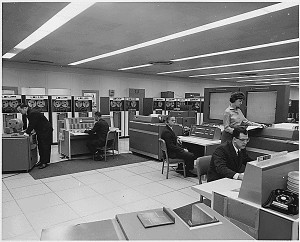
By NASA – This media is available in the holdings of the National Archives and Records Administration, Public Domain
We’re not in the 1950s any longer, where people would be recruited, trained and maintained by an employer for life. The change from one employer to many employers to complete changes in career to increasingly working independently or as a contractor have been seen and felt by people for decades now. Arguably it works well for people, who get to set their schedules, provide what services they want, and work as much as they’d like.
If you can work doing whatever work you’re capable of, when you want when it’s available you’re not hoping some “superior” recognizes you and decides you’re worth promoting. Contract style work arguable turns the whole idea of management/labor on it’s head, letting people succeed if skills, hard work and luck favor them.
The disadvantages, if you’ve ever worked as a contractor or self employed, are numerous, too. You have to pay for your own insurance and benefits. Time off comes out of your own pocket. If things don’t go well, no big company is there to bail you out.
A lot of the problems with working as a contractor are from the government. While you hear the old chestnut “Small business is the backbone of this country,” politicians do little for small businesses, and a lot against them. Big businesses are subsidized, given tax breaks and bailed out. Small businesses are expected to fail. The health insurance system, pre and post Affordable Care, is a disaster for small business. You basically get to pay for insurance and not get any benefit from it.
Robert Reich, the famous professor, speaker, and former Secretary of Labor under President Bill Clinton, seems to feel quite differently. While he’s clearly against policies that favor big business, he also seems against policies that support small business – by which I mean the smallest businesses. Take a look at this brief video to see his ideas for making everyone employees.
You don’t need a doctorate in economics to see what he’s proposing and know it would squash entire industries, opportunities for work, and would make companies extremely careful about using contractors. His idea seems to be to do away with sharing economy work and make 9-5 employees of nearly everyone. This is not what everyone wants, by a long shot. He may have good intentions in mind for people, but they certainly aren’t what those people have in mind. And you can imagine what would happen if a business would have to provide expensive benefits for any contractor who worked 20+ hours a week for them – they would not use contractors. This would harm businesses that use contractors, hard the contractors, and impact tax income for the governments regulating them.
My opinion isn’t theoretical. Many years ago I worked for an organization in Virginia, where anyone working over 35 hours a week would have to get full time benefits. They made sure I never worked more than 35 hours a week. There are a lot of similar regulations in other states, and companies do exactly the same thing. So instead of someone being able to work a lot of hours at one place, where they might learn and be recognized and be promoted, instead they have to work 3 or 4 jobs to have 20 hours at each.
While it’s a nice idea to force greedy businesses to provide for their contractors, the truth is sometimes businesses can’t afford to hire people as full time employees and provide benefits. I’ve been in this position. It would have been hugely beneficial for me to offer full time employment to great people I worked with. But I couldn’t afford it. So in the new world order where I’d have to provide expensive benefits to contractors who did too much work for me I’d have to use multiple people to avoid that, which would be less efficient, or I’d have to send all the work abroad, or just shut down.
The days of big businesses providing all work and people being the labor force are over. Trying to regulate commerce with this anachronistic view is harmful to everyone, and will only hurt people more. Instead of the government meddling more and getting involved with how big businesses work more, they need do less. Fewer regulations on health care, which would allow for individuals and groups to get decent health care. No subsidies or tax breaks or bail outs for big business. Fewer rules and complexities for small businesses.
If people in government actually care about small businesses, they need to stop hurting them. If they want to stop big businesses from tricking and cheating them and hiding all their money abroad, they have to stop helping and enabling that.



